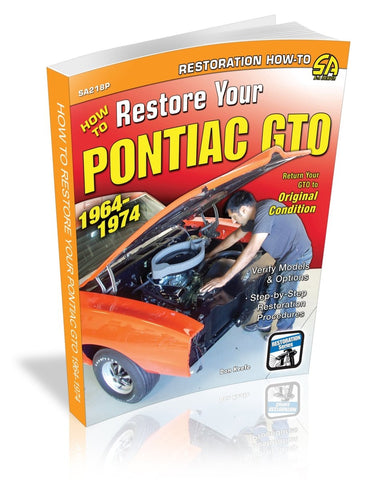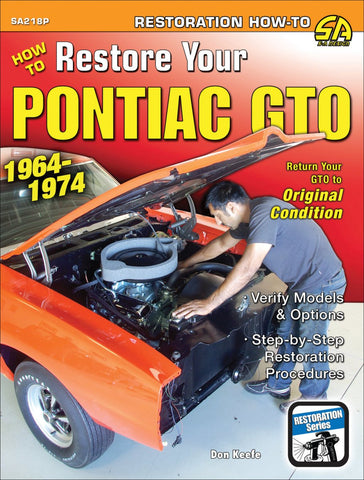Starting life as a hopped-up Tempest, the 1964 Pontiac GTO featured a 389 V-8, heavy-duty suspension, quick steering ratio, dual exhaust, and a floor shifter. Equipped with this performance package, the GTO set itself apart from other pedestrian coupes of the same era, and it made history. Many regard it as the first muscle car. As muscle car wars reached fevered pitch, the GTO would establish itself as one of the most prominent performance cars of the era, and from 1964-1972, more than 500,000 GTOs were built.
You are shown different levels of restoration and afforded the information to select the right type of restoration for your particular car. This book covers how to verify the authenticity of your particular car, the most desirable models to restore, and option information. Like our other Restoration Series books, this new entry focuses on the actual hands-on, how-to procedures for restoring a GTO to its original condition. Each chapter illustrates the key procedures for completing a specific portion of the restoration project with detailed captions and color photographs.
How to Restore Your Pontiac GTO covers all aspects of restoration - engines and drivelines, bodywork, interior and trim, suspension, brakes, chassis, and steering. The book provides guidance to assess your facilities, ability to do the work, and then determine the best course for completing the work. Sourcing and selecting the best parts for your restoration is also covered. If you are restoring any GTO of this time period, this book will be a valuable resource for years to come.
Starting life as a hopped-up Tempest, the 1964 Pontiac GTO featured a 389 V-8, heavy-duty suspension, quick steering ratio, dual exhaust, and a floor shifter. Equipped with this performance package, the GTO set itself apart from other pedestrian coupes of the same era, and it made history. Many regard it as the first muscle car. As muscle car wars reached fevered pitch, the GTO would establish itself as one of the most prominent performance cars of the era, and from 1964-1972, more than 500,000 GTOs were built.
You are shown different levels of restoration and afforded the information to select the right type of restoration for your particular car. This book covers how to verify the authenticity of your particular car, the most desirable models to restore, and option information. Like our other Restoration Series books, this new entry focuses on the actual hands-on, how-to procedures for restoring a GTO to its original condition. Each chapter illustrates the key procedures for completing a specific portion of the restoration project with detailed captions and color photographs.
How to Restore Your Pontiac GTO covers all aspects of restoration - engines and drivelines, bodywork, interior and trim, suspension, brakes, chassis, and steering. The book provides guidance to assess your facilities, ability to do the work, and then determine the best course for completing the work. Sourcing and selecting the best parts for your restoration is also covered. If you are restoring any GTO of this time period, this book will be a valuable resource for years to come.
About the Author
Acknowledgments
Introduction
Chapter 1: Selecting a Project
What Are Your Goals?
Level of Restoration
Rarity, Condition and Originality
NOS, Used or Reproduction Parts
Evaluating a Project Car
Club Benefits
Use the Internet to Your Advantage
Some Friendly Advice
Chapter 2: Disassembly
Planning, Tracking and Budgeting
Get Organized
Workspace and Tools
Getting Started
Body Off or On?
Repair or Replace?
How Deep Are You Going?
It’s Really a Parts Car—Now What?
Safety
Chapter 3: Bodywork
Typical Rust Areas
Paint Removal
Repair Patches
Floorpan and Trunk Floor Replacement
Quarter Panel Replacement
Quarter Patch Panel Preparation
Rust Preventers
Dent Removal
Filler
Body Tags
Collision Damage
Prepare Body for Painting
Chapter 4: Painting
Selecting Paint
DIY or Professional?
Safety
Choosing a Body Shop
What Can You Do Yourself?
Spray Gun and Compressor Setup
Masking the Car
Painting
Chapter 5: Engine
Time for a Rebuild?
Identifying an Engine
Choosing a Machine Shop
Repair or Replace?
Detailing the Engine
Engine Disassembly and Inspection
Engine Assembly
Chapter 6: Transmission
Rebuild or Replace?
Turbo Hydra-Matic 400
Automatic Transmission Upgrades
Super Turbine 300 to Turbo 350
Overdrives
Manual Transmissions
Muncie 4-Speed Disassembly
Muncie 4-Speed Assembly
Chapter 7: Suspension
Restore Safety, Functionality and Appearance
Inspection and Evaluation
Paint Finishes
Upgrades
Chapter 8: Brakes
Repair or Replace?
Check for Condition
Aftermarket Systems
Master Cylinders, Proportioning Valves and Lines
1964 Rear Drum Brakes
Chapter 9: Interior
Disassembly and Evaluation of Components
Authentic Reproductions
Mix and Match?
Vapor Barriers
Carpet and Sill Panels
Carpet Installation
Door Panel Installation
Deck Package Installation
Dash Pad Restoration
Pedal Assemblies
Steering Wheels
Seat Belts
Kick Panels
Console
Seat Installation
Chapter 10: Body Assembly and Alignment
The Process
Surprises
Door Alignment
Front Fender Fitting and Alignment
Hood Installation
Bumper Installation
Chapter 11: Electrical
Inspection of the Wiring
Harness Replacement
Trouble Spots
Upgrades
Source Guide










